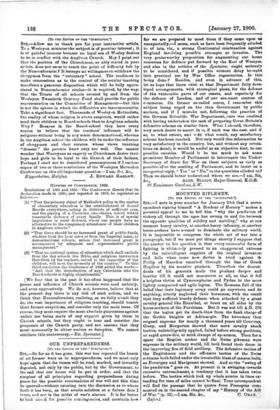[TO THE EDITOR OF THE "SPECTATOR-"]
SIE,—Allow me to thank you for your instructive article. To a Wesleyan minister the subject is of peculiar interest; it is of painful interest because no loyal son of Wesley desires to be in conflict with the Anglican Church. May I point out that the position of the Churchman, so ably stated in your article, does not seem to touch the point of difficulty felt by the Nonconformist P It betrays no willingness to withdraw the clergyman from the " voluntary " school. The readiness to make concessions as to the control of the secular teaching manifests a generous disposition which will be fully appre- ciated in Nonconformist circles—it is required, by the way, that the Trusts of all schools erected by and from the Wesleyan Twentieth Century Fund shall provide for public representation on the Committee of Management—but this is not the sphere in which the difficulties are insurmountable. Take a significant fact. Thousands of Wesleyan Methodists, the reality of whose religion is above suspicion. would rather send their children to Board-schools than to Anglican schools. Why P Because in the Board-school they have every reason to believe that the teachers' influence will be religious without being in any sense denominational, whereas in the Anglican school the children will be under the influence of clergymen and their curates, whose views touching "dissent" the parents know only too well. One cannot wonder that Wesleyans as eagerly as Churchmen desire their boys and girls to be loyal to the Church of their fathers, Perhaps I shall not be considered presumptuous if I enclose copies of two or three resolutions of the Wesleyan Methodist Conference on this all-important question.— I am, Sir, &c., M/NLITEI3 OP CONFERENCE, 1899.
Resolutions of 1891 and 1895 —The Conference directs that its declaration made in 1891, and repeated in 1895, be reprinted as follows:— (1) "That the primary object of Methodist policy in the matter of elementary education is the establishment of School Boards everywhere, acting in districts of sufficient area, and the placing of a Christian uns.-ctarian school within reasonable distance of every family. This is of special importance in rural districts, where our people have no alternative to the compulsory attendance of their children in Anglican schools."
"That there should be no increased grant of public funds, whether from the local rates or from the Imperial taxes, to denominational schools, unless that increased grant is accompanied by adequate and representative public management."
"That no national system of education which shall exclude from the day schools the Bible, and religions instruction therefrom by the teachers, suited to the capacities of the children, will meet the necessity of the country." To this third resolution the Conference of 1899 added the words- " And that the introduction of any Catechism into the Board-schools is highly objectionable."
[We fear that in the past it too often happened that the power and influence of Church schools were used unfairly, and even oppressively. We do not, however, believe that at the present day there is any risk of such action, and we think that Nonconformists, realising, as we fully admit they do, the vast importance of religious teaching, should banish their former suspicions, and consider only the main issue. Of course, they must require the most absolute guarantees against unfair use being made of any support given by them to Church schools, but they ought to hear and consider the proposals of the Church party, and not assume that they must necessarily be either useless or deceptive. We cannot continue this controversy.—En. Spectator.]


















































 Previous page
Previous page